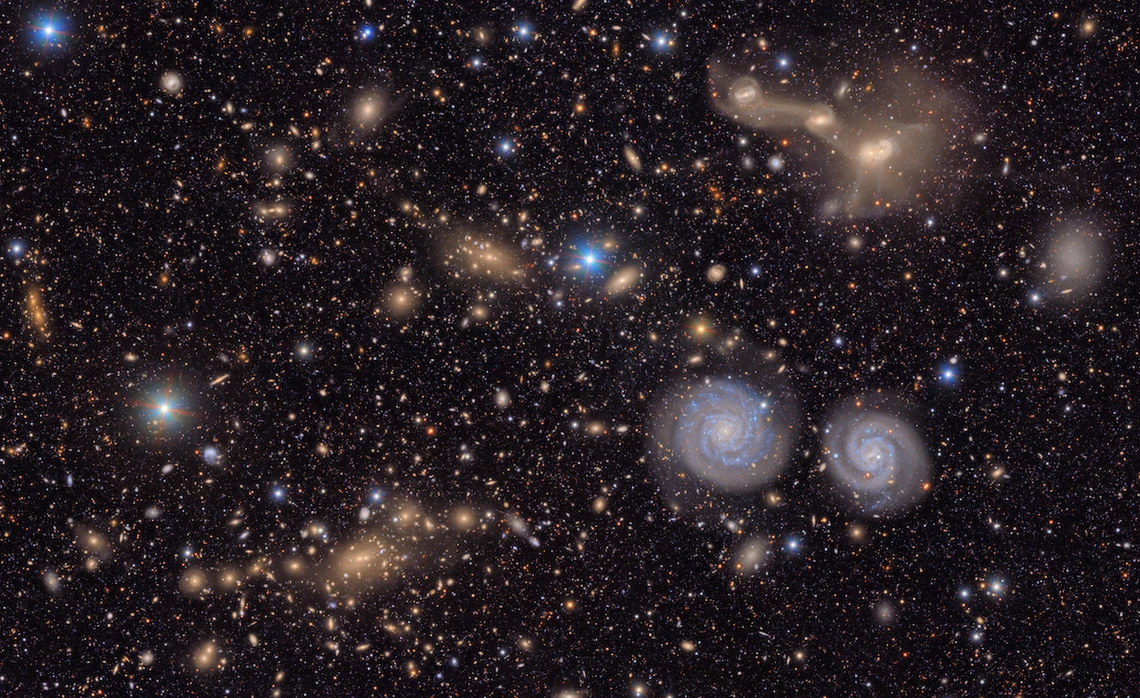In Brief: Mirror Lab milestone, new degree offerings

This image captures a small section of NSF–DOE Vera C. Rubin Observatory’s view of the Virgo Cluster, offering a vivid glimpse of the variety in the cosmos. Visible are two prominent spiral galaxies, three merging galaxies, galaxy groups both near and distant, stars within our own Milky Way, and much more.
NSF–DOE Vera C. Rubin Observatory
Rubin Observatory data will fuel university research for years
The University of Arizona is celebrating its role in capturing stunning images of asteroids, stars and millions of galaxies taken by a digital camera the size of a car. The Vera C. Rubin Observatory in Chile, which has released its first set of imagery, features a massive mirror – more than 27 feet in diameter – that was fabricated in the Richard F. Caris Mirror Lab, located beneath Arizona Stadium.
The milestone reflects decades of collaboration and scientific innovation involving U of A scientists. Among them are Roger Angel, Regents Professor of astronomy and founder of the Mirror Lab, who developed the telescope's optical design, and Peter Strittmatter, Regents Professor emeritus of astronomy, who was one of the earliest champions of the project alongside former University President John Schaefer.
Data captured by the Rubin Observatory will allow university researchers to examine some of the universe's deepest mysteries. Ann Zabludoff, professor of astronomy, will study tidal disruption events – or stars being ripped apart by black holes. Dennis Zaritsky, professor of astronomy, and Peter Behroozi, associate professor of astronomy, will use the data to study the evolution of galaxies and dark matter. Their work and other research led by U of A scientists will contribute to the observatory's upcoming Legacy Survey of Space and Time.
Read more about the university's role in the significant scientific milestone in a story published on the university's news website.
Colleges of Medicine, Eller offer new degrees
Three colleges are offering new degree programs to provide students more flexibility and career opportunities in a rapidly evolving job market.
The College of Medicine – Tucson and College of Medicine – Phoenix will offer three-year pathways to medical degrees beginning this fall. The programs are designed to address the shortage of primary care physicians in Arizona while allowing medical students to graduate a year earlier and reduce their debt.
The College of Medicine – Tucson will also offer a Bachelor of Science in medical device development and application. The program – expected to begin in spring 2026 – will be delivered through a collaboration among physicians, scientists, engineers, business professionals and lawyers, with a focus on medical field devices and technology.
Meanwhile, the Eller College of Management is offering four new master's degree programs launching this summer and fall:
- 1-Year MBA Program
- Online Master of Science in AI for Business
- Online Master of Science in Marketing
- Online Master of Science in Economics
The college says the program benefits through students through flexible online formats and networking opportunities with alumni.

